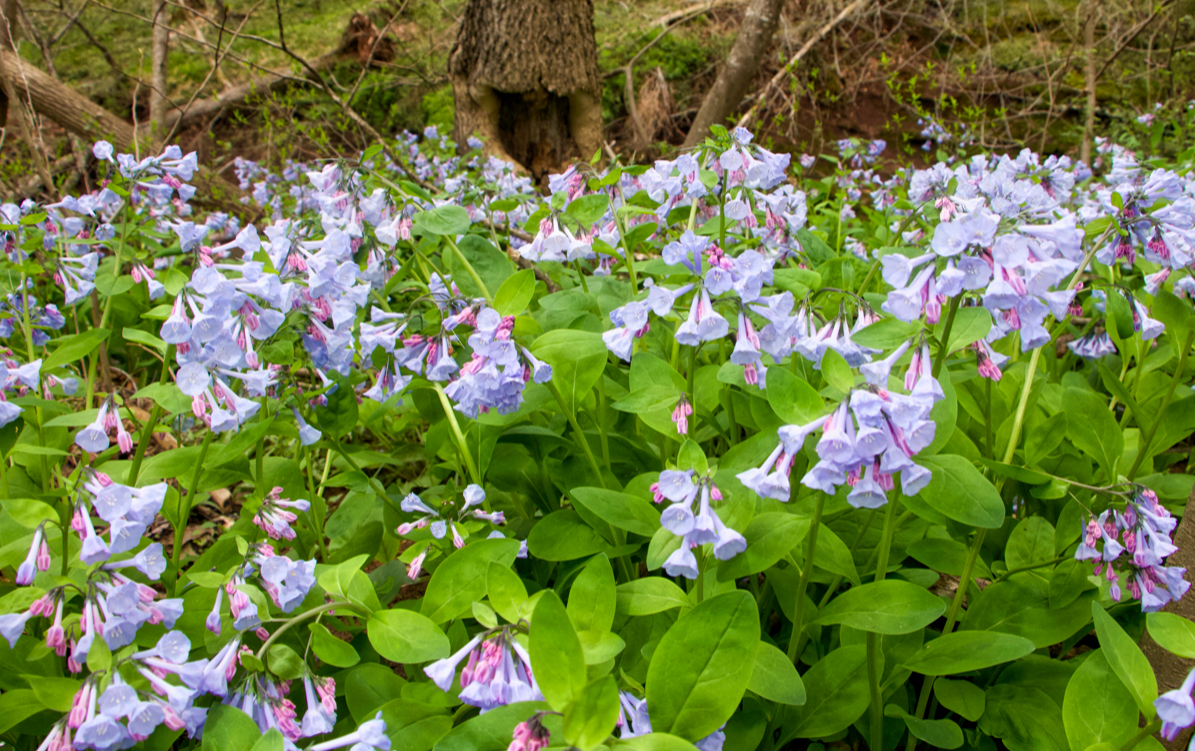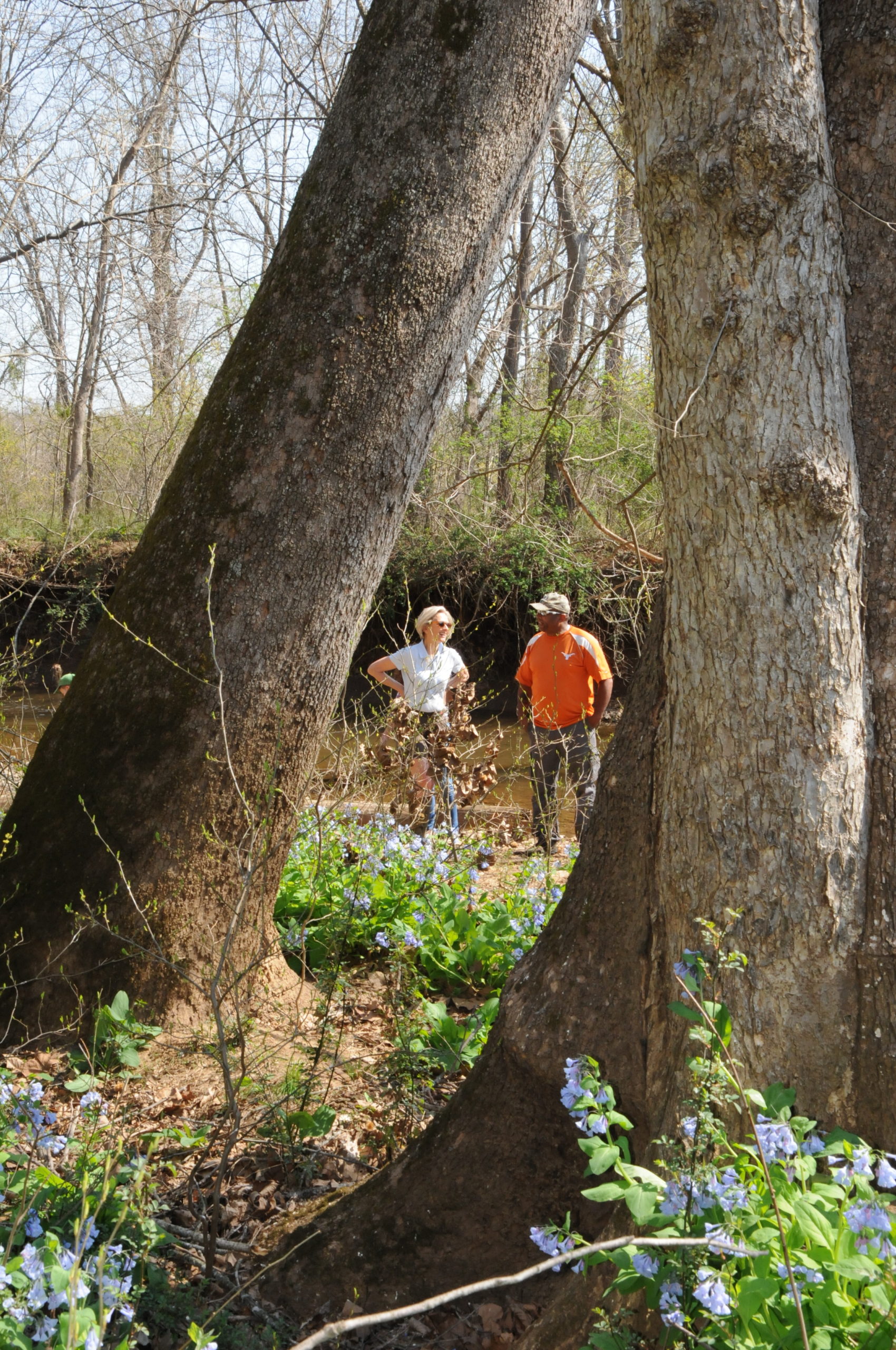
Contact:
Maggi Blomstrom, Rappahannock-Rapidan Conservation Initiative Coordinator
[email protected]
540-347-2334, x7067
CATLETT, VA. (April 1, 2022) – This Saturday, April 9, from 10 a.m. until 12 p.m., Mike and Margrete Stevens, the owners of Bonny Brook Farm in Catlett, will once again host The Piedmont Environmental Council’s Julian W. Scheer Fauquier Land Conservation Fund 14th Annual Bluebell Walk on Cedar Run (after a two year pandemic-related hiatus). But this year, in addition to sharing their stunning swath of vibrant streamside ephemerals, the Stevens are hoping the one-mile walk through their picturesque farm fields on the way to Cedar Run will serve as a demonstration of small, incremental steps landowners can take to improve the stewardship of land and water on their own properties.
“The stars of the show are the Virginia bluebells, but this 14th Annual Bluebell Walk will also be an opportunity for visitors to see a small-scale, half-acre buffer planting in action on a privately-owned property,” said Maggi Blomstrom, Piedmont Environmental Council’s conservation field representative.
Along the casual, flat walk toward the banks of Cedar Run, visitors will pass by an area of newly planted trees along the bank of the stream. The landowners are participating in The Piedmont Environmental Council’s Potomac Planting Program, which provides free native trees and shrubs, tree tubes to protect against deer-browsing, and hands-on help planting the trees and shrubs along streams, ponds and rivers. These riparian plantings help protect water quality, minimize streambank erosion, and create important habitat for terrestrial and aquatic life alike. Naturalists will be on hand to help identify native plants and trees along the way.

“Bonny Brook Farm is forever protected with a conservation easement, but the owners want to explore how easements can be just one of so many steps that landowners can take for the benefit of grassland birds, wildlife, and water quality,” Blomstrom said. “They also plan to work with other local conservation partners, such as The Clifton Institute and the Virginia Department of Forestry, to restore native meadows, manage invasive plant species, and help encourage a healthier stand of forest to support pollinators and wildlife.”
Funded in part by a National Fish and Wildlife Foundation Chesapeake Bay Small Watershed Grant and a Virginia Environmental Endowment grant, the Potomac Planting Program is part of PEC’s Headwater Stream Initiative launched in 2016 in partnership with Friends of the Rappahannock. Focused on the Rappahannnock and Potomac river watersheds, it supports Virginia’s role in a multi-state effort to reverse the impacts of pollution in both our inland waters and the Chesapeake Bay. Learn more about this program and sign up at pecva.org/buffers.
The 14th Annual Bluebell Walk at Cedar Run is free, but registration is requested so that organizers can ensure adequate parking. Donations are welcome in support of the Julian W. Scheer Fauquier Land Conservation Fund for continued land and water conservation efforts in Fauquier County. As with all outdoor activities, attendees are encouraged to wear appropriate clothing and sturdy shoes that can get dirty and to bring along tall boots or waders, as a special treat awaits those brave enough to wade across Cedar Run. Visitors are asked to leave their furry friends at home for this event. Learn more and register at: https://www.pecva.org/event/14th-annual-bluebell-walk-along-cedar-run/
#####
Since 1972, The Piedmont Environmental Council has proudly promoted and protected the natural resources, rural economy, history and beauty of the Virginia Piedmont. PEC empowers residents to protect what makes the Piedmont a wonderful place, and works with citizens to conserve land, improve air and water quality and build thriving communities. PEC is a 501(c)(3) non-profit and accredited land trust. Learn more at www.pecva.org
